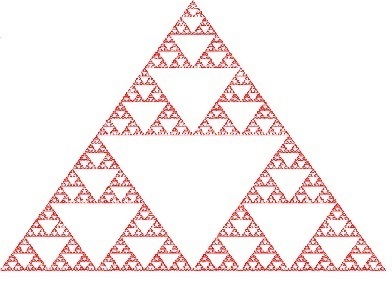Sierpinski's Triangle - 1

Sierpinski's Triangle is a self-similar fractal. To construct it do the following:
Take a red equilateral triangle of area 1. For each red triangle:
-
Find the midpoint of all sides.
-
Connect the midpoints.
-
Shade the formed triangle white.
If you repeat these steps (in the bullet point list) an infinite amount of times, the limit will be Sierpinski's triangle.
Let step 0 be the step for which the triangle is completely red.
Colors are chosen at random.
Question: In step of Sierpinski's triangle, there are red triangles, how many red triangles will there be in step ?
See the next problem .
Note: This problem is part of a set of problems, further investigating Sierpinski's Triangle in different ways. If you want to continue investigating click here . Questions will increase in difficulty.
Image Credits: Sierpinski's Triangle Image created by William Andrus. Removed grey outline.
This section requires Javascript.
You are seeing this because something didn't load right. We suggest you, (a) try
refreshing the page, (b) enabling javascript if it is disabled on your browser and,
finally, (c)
loading the
non-javascript version of this page
. We're sorry about the hassle.
At step 0 we have only 1 red triangle
At step 1 the previous red triangle is divided into four identical triangles, 3 of which are red . Hence, there are 3 ( 1 ) = 3 red triangles .
At step 2 each red triangle in the previous step is divided into four identical triangles, 3 of which are red. Therefore, since there were 3 red triangles in step 1 , now there will be 3 ( 3 ) = 9 red triangles .
At step 3 each red triangle in the previous step is divided into four identical triangles, 3 of which are red. Therefore, since there were 9 red triangles in step 2 , now there will be 3 ( 9 ) = 2 7 red triangles .
Repeating this process, we get that if at step n there x red triangles then at step n + 1 we will have 3 x of them.